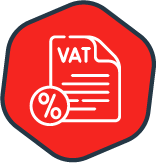Is your company struggling with debt? Unsure what options are available to you?
- Qualify for a CVL, CVA or MVL?
- Used by 1000s of businesses
- Free online assessment
We can help with...
Find the right business debt solution in 3 simple steps

Take the test
Complete our simple online assessment test (takes just 60 seconds)

Review your options
Based on the outcome of your assessment, consider the options available to your business

Get free advice
Speak to a professional business debt advisor and receive initial help and advice for free, with no obligation
About CommercialDebt.co.uk
In 2019 there were 17,196* registered insolvencies in the UK. Although there can be many measures put in place to make sure your business is a resounding success, unfortunately it doesn't always work out that way and owners are faced with the prospect of insolvency.Luckily, if you find yourself in this situation this is not the end and personal and commercial recovery is very much possible. The next steps you take are extremely important however.
To help figure out what these steps are, below we've put together a list of potential solutions to help you and your business.

What options are available?
In 2019 there were 17,196* registered insolvencies in the UK. Although there can be many measures put in place to
make sure your business is a resounding success, unfortunately it doesn't always work out that way and directors are
faced with the prospect of insolvency.
Luckily, if you find yourself in this situation this is not the end and personal and commercial recovery is very much
possible. The next steps you take are extremely important however.
There are many options available to companies struggling financially. However, it is also important to consider the consequences before deciding how you should proceed.
For further information relating to the consequences of these solutions please click here. As part of our service, our trusted provider will take a look at your financial situation, explain the available options, and advise which solution could be suitable for you.
To help you understand your options, below we've put together a list of insolvency solutions to help you and your business if you find yourself unable to pay your debts as and when they fall due. In the first instance you should consider your company’s insolvency position against the two tests of insolvency:
1) The balance sheet test, where if your liabilities outweigh your assets you are balance sheet insolvent; and
2) The cash flow test, where you are unable to pay your debts as and when they fall due.
If either of these tests are met then you may be insolvent and it is important you get specialist advice as soon as possible.
Informal Insolvency Solutions
Sometimes a formal insolvency procedure is not required and there are informal options available to you such as refinancing or time to pay arrangements with one or more creditors. These options are advantageous when, for example, you have a single pressing creditor or suffering short term cash flow problems however as it is not a formal insolvency process it does not stop further action taking place by creditors.
Moratorium
A recent change in 2020 to insolvency law has introduced a ‘Moratorium’. The purpose allows the company some breathing space to consider and implement rescue options while enforcement or other legal action is restricted. The effect of the moratorium is that there will be a payment holiday whilst it is in place for any debts incurred pre-moratorium except for the following six categories of debt:
- The monitor’s remuneration and expenses.
- Goods and services supplied during the moratorium.
- Rent for the period of the moratorium.
- Wages and salary.
- Redundancy payments.
- Financial services contracts, including bank loans.
This process is not a formal insolvency procedure although is a matter of public record as there is an obligation to notify Companies House and all creditors affected. The initial period of the Moratorium is for 20 business days. Once the moratorium ends, the payment holiday will end and the company will be obliged to pay its debts on an ongoing basis. If the moratorium has been unsuccessful and the company enters into some form of insolvency process, then the company’s debts will be dealt with as part of that process. Benefits The company does not enter a formal insolvency process.
Creditors Voluntary Liquidation (CVL)
A Creditors Voluntary Liquidation or a CVL is a terminal insolvency process that winds up the company in an orderly fashion when it has become insolvent.
A CVL is a Director led process and starts with a board meeting of Directors where the Directors consider the solvency of the company and if confirmed to the satisfaction of the board that the company is insolvent, the Directors call a general meeting of shareholders to pass resolutions to wind the company up and appoint a liquidator. Following the shareholders meeting at which the company is put into liquidation, there is a decision procedure of creditors whereby creditors ratify the decision of the shareholder’s choice of liquidator. The decision procedure can be one of either a virtual meeting of creditors where creditors can attend the meeting virtually or a deemed consent procedure whereby the shareholder’s choice of liquidator is automatically approved unless creditors actively object to the liquidator. This does not stop the liquidation from commencing but means the nominated liquidator may be replaced by a different liquidator if requested by creditors. It is important to highlight the decision to put the company into liquidation is the shareholders decision not the creditors.
A CVL is a process that can last for many years.
The cost of a CVL can be difficult to estimate. For example, if you want to buy the assets of the business back from the liquidator then the fees will generally be higher as the assets will need to be valued by an independent third party agent to ensure fair value is paid. If the company is ceasing to trade and there are no assets to consider the cost of a CVL will be considerably less.
If you buy the assets back from the liquidator you can continue to trade under the same or a similar name but you must ensure you abide by insolvency legislation relating to the re-use of a company name or you face personal and potentially criminal liability. You can trade as a new limited company and can remain as a Director of your new business.
Unless you have given personal guarantees then there is no personal liability and this process will not affect your personal credit score.
Benefits
- Creditor claims remain with the business and are dealt with by the liquidator (unless you have given personal guarantees).
- Stop creditor pressure.
- Ability to have a fresh start.
- No personal liability (unless you have given personal guarantees or have done something fundamentally wrong).
- Can become a director of a business/company in the future.
- Does not affect your personal credit score.
Company Voluntary Arrangement (CVA)
A Company Voluntary Arrangement or a CVA, is a legally binding contract that enables a compromise between a business and its creditors.
To pass, 75% of creditors must vote in favour of a CVA. Once accepted all creditors are legally obliged to accept the terms of the arrangement. Creditors may choose to send a representative to vote on their behalf or not attend at all. If it is the latter then they will not be accounted for in the vote.
Terms of the CVA will have to be deemed realistic and the entire process will be overseen by a licenced practitioner or "supervisor".
Any existing terms you have with creditors will be superseded with the terms of the CVA.
The CVA will be effective from the day of the creditors meeting. This will protect against any further action against your business from your creditors. The exception to this is if it looks as if your business is heading for liquidation.
The repayment window will be up to 5 years (60 months) and generally takes around 3 weeks to set up but this can vary.
A CVA will have no impact on your personal credit score. Once a CVA is in place you will remain in control of your company as director and be in control of the day to day running of your company. Your supervisor will simply monitor the terms of the CVA are being met and will not be in control of your company operations.
Benefits
- Pay what is affordable over a period of up to 5 years.
- Business can continue trading and restructuring.
- Prevents liquidation.
- Unlike administration the process is not published publicly.
- Creditors are assured of repayment and may continue to trade in the future but on amended terms.
- Can prevent a winding-up petition from taking place.
Company Administration
Company Administration provides a legal stay against creditor action and is designed to help struggling but still commercially viable businesses.
It is an effective way of dealing with threats from creditors of legal action, particularly in relation to a winding up petition.
This may be a viable option if your creditors cannot be persuaded to an out of court settlement or through consensual means.
If directors are concerned of any wrongful trading then this would also be a desirable route to take.
Benefits
- Your business is protected against further legal action from creditors.
- Control of the business is given to a professional administrator.
- If viable the business can avoid liquidation.
- You can still propose a CVA whilst your business is in administration.
Pre-Packaged Administration
A type of administration that may be more suited to certain situations is Pre-Packaged Administration. Pre-Packaged
Administration gets its namesake from the fact that the sale of the business is "pre-packaged" prior to the formal process taking effect.
PPA provides a seamless transfer between one business entity to another. This is the easiest way to retain customers,
staff and assets during insolvency.
Third parties are eligible to buy back the business and will actively help to find a buyer so if you're looking to wash
your hands with the business and walk away, this could be the perfect solution.
PPA has somewhat of a negative public reputation due to the perception that they are used by shady directors as a means of cutting an underhanded deal with the administrator which is able to leave debt and HMRC tax payments behind however this is not the case.
Like all insolvency processes there will be creditors that are not paid however this process was created by the Government to encourage entrepreneurship and rescue viable businesses that would otherwise have to be liquidated which would result in lower returns to creditors.
Benefits
- New lease of life for a business burdened with historic debt.
- A new business but without the debts of the old one.
- If you're looking to sell, a buyer will actively be searched for.
- Viewed more positively than liquidation.
Compulsory Liquidation
A Court led insolvency process of winding up a business' affairs when it has either reached the end of its life or cannot pay its debts when they are due. A winding up petition is issued against the company and the Court will order the company into liquidation. The Official Receiver is initially appointed as liquidator to deal with the affairs of the company. Directors will remain in office but will lose their executive powers. Directors will be contacted by the Official Receiver and will be required to cooperate, for example, attending an interview in person or over the telephone to explain the reasons for the liquidation and delivering up the company’s books and records.
Despite all of the negative connotations around liquidation you will still be able to be a director of a business in the
future and it will not affect your personal credit score.
Benefits
- Creditors' claims remain with the company and are dealt with by the Official Receiver (unless you have given a personal guarantee).
- Stop pressure from creditors.
- Ability to have a fresh start.
- No personal liability, unless you have given a personal guarantee or have done something fundamentally wrong.
Hopefully that has given a bit of clarity on what would be the best next step when it comes to your business. Unfortunately,
there is no one size fits all solution to corporate insolvency and ultimately the final decision lies on you.
Luckily, Commercialdebt.co.uk are experts in finding only the best insolvency solutions from the UK's most trusted firms. To
find out if we can help today just click the "start free test" button below and complete our 2 minute assessment test.

 HMRC Fines, Penalties & Pressure
HMRC Fines, Penalties & Pressure  Corporation Tax Arrears
Corporation Tax Arrears  VAT Arrears
VAT Arrears  PAYE Arrears
PAYE Arrears  Trade Creditors
Trade Creditors  Bank & Credit Card Debt
Bank & Credit Card Debt  Business Rates
Business Rates  Utility Bills
Utility Bills  Vehicle Leasing
Vehicle Leasing